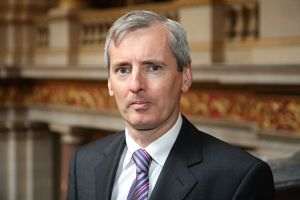Last week brought a first in the area of the monetary policies promoted by the main European central banks, the European Central Bank and the Bank of England.
Financial Times reports that the Bank of England, under the leadership of new governor Mark Carney, has set off into a series of "preannouncements" much earlier than the market expectations. The new keyword, which will show up at an increased frequency in the international financial press in the future, is "forward guidance", of the next moves of the central banks on the chessboard of international financial markets.
After so many years of crisis, it is clear that the main central banks have run out of options. Cutting interest rates hasn't worked, just as the switching to the direct printing of money wasn't effective.
Words are all that is left. The statements of Ben Bernanke, who is still the chairman of the Federal Reserve, about a possible slowdown of the quantitative easing program, have forced the European Central Banks to "swear" that they would not abandon printing money.
Jeremy Warner writes in The Telegraph that "the ECB settled for saying little and riding the wave as long as the Fed used quantitative easing", but it has now been forced to express its point of view. The Financial Times writes that the preannouncement of the Bank of England came one month early, with its goal being "to show the markets that they were wrong when they assumed the gradual drop of the ultra-loose monetary policy by mid 2015".
In spite the fact that Mark Carney was called by the Wall Street Journal one of the "pioneers of pre-announcement", new voices which are "unhappy" and pleading for more "innovation" have begun speaking out.
On Bloomberg, Clive Crook writes that the new governor "should make the Bank of England into an innovator", by setting a target for the nominal GDP. Back when he was a governor of the Bank of Canada, Carney backed the idea of targeting a nominal GDP, but then dropped it. Regardless, aside from its flaws in measuring the performance of the real economy, the nominal value of the GDP, only represents another attempt to create the illusion of welfare, by diverting attention to the money value of goods and services. And once set as a target, this can only grow, merely through printing currency.
While the president of the ECB and the governor of the Bank of England would assure the markets that the they would keep interest rates low for "an extended period", Goldman Sachs published a study which called for a faster rate of quantitative easing in Europe.
The banks were supposed to print more money, according to online publication Deutsche Wirtschafts Nachrichten, because "the economy will enter a recession in the following months".
Could it be just a coincidence that the publication of the study by Goldman Sachs happened almost simultaneously with the statements of the two leaders of the central bank, both of them former high ranking employees of the American investment bank?
The same bank has asked the Federal Reserve to grant it a grace period of two years for separating its operations on the financial derivatives markets from its other operations. Bloomberg writes that the request was approved, and as a result Goldman Sachs avoided a quick liquidation of the swap operations by July 16th, 2013. Since most of the swap operations represent the trading of interest flows based on a notional value, the decisions of the two central banks represent a great help in the orderly squaring of these trades.
The Goldman Sachs report also writes that "we are open to the potential opportunities provided by Europe", as the forecasts for "outlook of new money - especially in Great Britain and in Central Europe - are greater than they are in other countries", according to Deutsche Wirtschafts Nachrichten.
Maintaining the ultra-loose monetary conditions in Europe is also vital in terms of the major capital deficits in the banking system, which not only affects the banks on the outskirts of the Eurozone, but those in its core as well.
In this context, the report from the BIS (Bank for International Settlements) on the consistency of the methodology used by the largest banks in the world to determine the capital adequacy ratio couldn't have come at a worse time. According to the study achieved by the Basel committee of the BIS, the capital adequacy ratios show major differences between the banks, subject to their evaluation for an identical level of capital and of risk in their loan portfolios.
"Credit risk is the main component of the risk weighted assets and the dominant source of their discrepancies between the banks", the report of the Basel Committee writes. What does this show? The "creative" interpretation of the risk weights allocated to the various categories of assets in the loan portfolios, in order to lower the levels of risk weighted assets, to make the ratio between capital and the former look "good". That is to say nothing about the interpretation of the notion of banking capital, which is just as "creative".
An article from Financial Times about the BIS report writes that "banks from Europe were even more aggressive in the interpretation of the risk weights", which indicates an overvaluation of the adequacy rate of capital recommended in the Basel II Agreement.
These are all more than sufficient reasons for continuing quantitative easing, especially when a bank the size of Goldman Sachs asks the central banks so nicely.
But do the central banks need any excuse? In an interview recently granted to King World News, Swiss investor Marc Faber said that "central banks will always find excuses to print more money" and that they will continue to "misinform the population", as "they will never take any responsibility".
However, the European Central Bank has even begun having real reasons for action. New orders for capital goods in Germany have fallen at an annual rate of 2.2% in May 2013, as the domestic orders have seen their annual drop fall to 6.2% at an annual rate, and the orders from the Eurozone fell 11.7% over the same period of the previous year. Without investments in new capital, where can the increase in productivity and salaries come from? Nowhere!
This is the reason why the orders for consumer goods have fallen significantly, which is terrible news for the central banks, which are still focused on the harmful ideology of boosting consumption, seen as an engine of economic growth.
When the Federal Reserve launched the concept of "forward guidance", in the beginning of 2012, Benn Steil, a director with the Council on Foreign Relations, explained why the American Central Bank lacks credibility. Citing internal studies of the Federal Reserve, Steil shows that the effectiveness of its forecasts is far weaker compared to those in the private sector. Even the Fed acknowledged that "the mistakes are big in economic terms".
"In brief, the premise that the Fed can speak with authority about the future is wrong", Steil concludes, and "the transparency that Bernanke speaks about is in fact a badly conceived plan to force dissidents on the monetary policy committee to adhere to his ideas."
So far, the forecast of Benn Steil, made one year and a half ago, proved correct: "I think that the result of the effort will be very different: the increase in the level of distrust in the markets concerning the targets and the expectations of the Fed."
They have now joined the so-called transparency generated by "forward guidance" and the main European Central Banks. There is only one goal behind it: covering the increasingly deep craters in the real economy under an unprecedented flood of money, which will also disguise the biggest transfer of wealth in history, by forcing people to trade in their real assets in exchange for the paper money "flowing" towards certain privileged sectors.
When the population realizes that the goal of its guides was not to lead them towards the end at the light of the tunnel, the only thing they will be able to do will be to create makeshift torches from its paper money to escape the darkness on its own.


















































